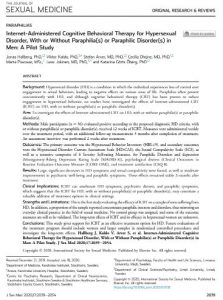Mental Health
Internet-Administered Cognitive Behavioral Therapy for Hypersexual Disorder
 Full Article Title: Internet-Administered Cognitive Behavioral Therapy for Hypersexual Disorder, With or Without Paraphilia(s) or Paraphilic Disorder(s) in Men: A Pilot Study
Full Article Title: Internet-Administered Cognitive Behavioral Therapy for Hypersexual Disorder, With or Without Paraphilia(s) or Paraphilic Disorder(s) in Men: A Pilot Study
Open Access: No
Abstract
Background: Hypersexual disorder (HD) is a condition in which the individual experiences loss of control over engagement in sexual behaviors, leading to negative effects on various areas of life. Paraphilias often present concomitantly with HD, and although cognitive behavioral therapy (CBT) has been proven to reduce engagement in hypersexual behavior, no studies have investigated the effects of Internet-administered CBT (ICBT) on HD, with or without paraphilia(s) or paraphilic disorder(s).
Aim: To investigate the effects of Internet-administered CBT on HD, with or without paraphilia(s) or paraphilic disorder(s).
Methods: Male participants (n = 36) evaluated positive according to the proposed diagnostic HD criteria, with or without paraphilia(s) or paraphilic disorder(s), received 12 weeks of ICBT. Measures were administered weekly over the treatment period, with an additional follow-up measurement 3 months after completion of treatment. An assessment interview was performed 2 weeks after treatment.
Outcomes: The primary outcome was the Hypersexual Behavior Inventory (HBI-19), and secondary outcomes were the Hypersexual Disorder: Current Assessment Scale (HD:CAS), the Sexual Compulsivity Scale (SCS), as well as a tentative composite of 6 Severity Self-rating Measures, for Paraphilic Disorders and depression (Montgomery-Åsberg Depression Rating Scale [MADRS-S]), psychological distress (Clinical Outcomes in Routine Evaluation Outcome Measure [CORE-OM]), and treatment satisfaction (CSQ-8).
Results: Large, significant decreases in HD symptoms and sexual compulsivity were found, as well as moderate improvements in psychiatric well-being and paraphilic symptoms. These effects remained stable 3 months after treatment.
Clinical Implications: ICBT can ameliorate HD symptoms, psychiatric distress, and paraphilic symptoms, which suggests that the ICBT for HD, with or without paraphilia(s) or paraphilic disorder(s), may constitute a valuable addition of treatment options in clinical settings.
Strengths and Limitations: This is the first study evaluating the efficacy of ICBT on a sample of men suffering from HD. In addition, a proportion of the sample reported concomitant paraphilic interests and disorders, thus mirroring an everyday clinical practice in the field of sexual medicine. No control group was assigned, and some of the outcome measures are still to be validated. The long-term effects of ICBT and its efficacy in hypersexual women are unknown.
Conclusions: This study gives support for ICBT as an effective treatment option for HD. Future evaluations of the treatment program should include women and larger samples in randomized controlled procedures and investigate the long-term effects.
